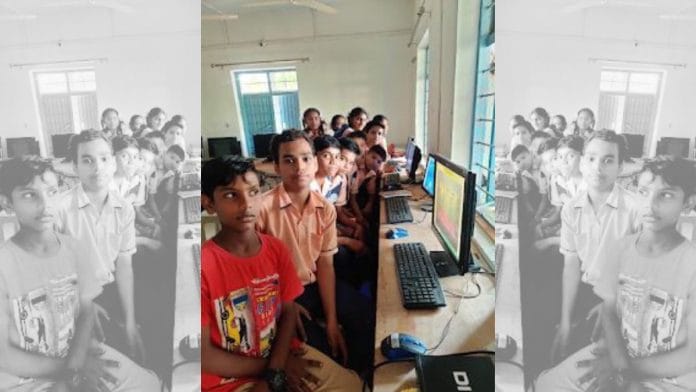Thank you dear subscribers, we are overwhelmed with your response.
Your Turn is a unique section from ThePrint featuring points of view from its subscribers. If you are a subscriber, have a point of view, please send it to us. If not, do subscribe here: https://theprint.in/subscribe/
Far from the hustle and bustle of the metros, a silent revolution is shaping the country’s rural and tribal hinterlands in educational uplift. With the launch of Amit Khare Training for Indian Villages (AKTIV) Thinking and Teaming Lab (TTL), Guruji Education Foundation is ushering in a concept that seeks to improve critical, creative, computational thinking, and teaming skills among children of Sindhudurg, Palghar, Thane, Pune, Solapur, Sambhaji Nagar, Jalgaon, Sangali, Thanjavur (Tamil Nadu) and Khargone (MP) districts making them ready for new age, future jobs.
GEF has taught software development using “MIT-Scratch” at five schools, in the pre-Covid years. Recognizing the potential of this program to develop thinking and teaming skills, GEF launched AKTIV TTL program to give this effort a higher traction. GEF has enrolled 14 schools covering over two thousand, 6th to 9th standard, students in the last year.
Rationalizing the choice of the model, Gopal Kalpathi, the GEF AKTIV Program Manager, says the primary reason for choosing the Scratch platform is it promotes analytical abilities in the students. “The purpose is not to teach just programming but to develop critical thinking and teaming skills.” It offers a simple visual interface that allows adolescents to create digital stories, games, and animations and has given rise to the world’s largest coding community. To create a scratch script, one simply snaps together graphical blocks, much like LEGO bricks or puzzle pieces. By allowing to blend graphics, photos, artwork, music, it enables characters that dance, sing, and interact with one another. It is a novel and creative way which encourages students to create their stories, their very own movies.
GEF facilitates the necessary computing and network structure, hires and trains trainers, teaches in batches of 20 students for 90-120 minutes a week, and monitors /tracks success using assessments tools. Teamwork is encouraged with competitive performances. The trainers include the school’s teachers, GEF’s hired teachers, and bright students from the school itself.
The Foundation willing pursues the challenge of finding passionate, competent teachers and managers in rural areas. Encouragement comes from the spirit of educating rural students who account for 65% of India’s rural population. Tapping rural students, helping them realize their potential by providing the right tools at the right inquisitive age, will mean a bright future for them and, by natural corollary, the society and country.
The futuristic approach of the GEF also underlines that, in the 21st century, facts and information matter less and children need to learn thinking and teaming skills to solve real-life problems. It surmises that computing makes children become pro-active and creative learners as they explore ideas through hands-on activities using powerful, yet simple tools. They learn to think and analyse on how to achieve objectives and master computers. They lose their fear of computers in the process.
“Computational thinking”, the art of the using computers to do their bidding, helps student get a grip on complex problems, solving them by breaking them into smaller sub-problems and using team approach. In the world of programming, answers are not simply “right” or “wrong”. A child’s mindset gets fine-tuned to brace up real-life problems. Their perspective changes from being a “software user” to a “software builder”. Together, this teaching algorithm prepares the children for not only IT but also for a majority of jobs of tomorrow, across many sectors.
Having zeroed in on the curriculum and the methodology of implementing it, the Foundation has developed a Marathi-English bilingual lesson-book that is weaved around rural culture. The children’s progress is tracked through quiz assignments, problem solving exercises and annual inter-school scratch day competitions. The foundation, recently conducted its annual competition wherein 10 schools – 2 from tribal belt – participated in 50 day long activities, culminating in the scratch day on 4th August, which included virtual events such as debating, quiz, hackathon, and smart solutions that engaged over 100 students for more than 7 hours. The event was inaugurated by Padma Shri Prof Deepak Phatak, Chairman BOG of IIT Indore and, Mr Achyut Godbole, a distinguished IIT Bombay alumnus, well-known thinker and writer. They extolled the SCRATCH projects that GEF has been doing and emphasized the need of spreading them across the length and breadth of the country.
These pieces are being published as they have been received – they have not been edited/fact-checked by ThePrint.


